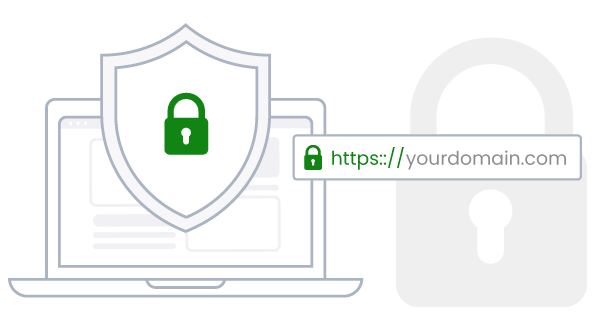10 Tips to Guide Your Website Security Policy
One of the greatest concerns of website owners is website security. Unfortunately, a lot of website owners imagine that the security of their websites lie with their web hosting company alone. In this post, we will discuss website security basics and 10 things you need to keep in mind to secure your website.
Tips For Your Website Security
Here are 10 basic rules that should guide your website security policy. In this post, we adopt a pragmatic and user-oriented approach so it is not just a theoretical discussion but we make the points actionable.
Strong Passwords
You already know this. Avoid names, street names, dates of birth and such words that can be found in dictionaries. We strongly recommend a password strength of at least 10 digits and it should be a combination of small and capital letters, special characters and numbers. The length of your passwords and its complexity does not matter. It is better you rest your passwords because you forgot it than being a victim of a brute force attack.
Read more: 6 Ways To Shield Websites From Security Hacks
Protect Your Website Primary Emails
Every website is hosted in an environment and the email assigned to the hosting account is one with which you can reset passwords and login to the customer portal of your host. Apart from securing your website backend or control panel sign in details, you also need to protect the primary email assigned to your website (as owner email).
That way, access to reset login passwords is not possible.
3. Always Maintain a Healthy Backup
This is one of the best security measures you must take especially if you run a content management system (CMS). This important because you never can tell what will happen or the mistake you can possibly make with codes, during a plugin install, or an accidental deletion. A backup restore will be the safest and best way to get back your website to a functional state.
We recommend that you generate a backup and download it to your desktop.
Read more: WordPress Maintenance Tasks You Need To Perform Regularly
4. Keep Your Applications and Software Updated
The internet is constantly changing and so are the security challenges websites face. To cope with these changes, software and applications are constantly updated. Some of the major reasons you have software updates is to fix bugs, improve the software security and performance. Overall, these will improve the stability of your website and keep your online business safe.
Further reading: How A Plugin Installation Can Crash A WordPress Website
5. Internal Leaks and Compromises
Most high profile data breaches have been linked to internal password hints and leaks. It is therefore important to secure your passwords in the best ways possible. One way to do this on Linux servers is to use the htaccess file to limit access to certain sections and folders on your site. We will discuss this feature in greater detail subsequently.
Read more: 6 Ways To Shield Websites From Security Hacks
6. Limit Access to Secured Folders and Files
This practice had long been used to prevent access to secured user data and ensure that visitors do not gain access to restricted areas of a website. For most websites and applications like WordPress, Joomla, OpenCart and other applications and Content Management System which allow user registration, access restriction is used to protect user data and security.
Further reading:
How To Secure A Website With The .Htaccess File
How To Prevent Your Website From Exploitation
7. Play By The Rules – Avoid Spamming
The easiest way to get your website suspended by your web host is to spam. The web hate spamming and it can be very harmful to the growth of your online business. First, Google frowns at it so your website could easily get penalized by Google for spammy behavior. Secondly, your web host will also penalize you for spamming and the penalty could be as severe as a termination. So, to keep your website up and running without disruptions, the best solution will be to avoid all spammy behavior.
One of such behavior will be mass mailing against the limits allowed by your server. When the mail queue manager is loaded with failure deliveries from your email account, it raises a red flag. The other spammy behavior which Google frowns at is bad link building practices like placing links in comment boxes, link purchases, reciprocal links and other unacceptable link building practices.
Further reading:
Common Reasons Access To Your Website Can Be Restricted
Website Security Guide For Shared Hosting
8. Use Security Plugins
If you run a WordPress website or other Content Management Systems, you can boost your security with plugins. You can try the ALL in One security suite or WordFense security tools. They are all easy to configure and start working once they are installed. You may improve their functionality with a few tweaks to improve how the tools handle things like brute force, bot attacks and firewall settings.
Further reading:
WordPress Plugins You Can’t Do Without
9. Optimize Your Website For Speed
One of the big issues with content management systems is that they are slow out of the box. Be it WordPress, Magento, Drupal, Joomla or any other, they are slow without speed improvement tweaks. Web hosting companies hate slow websites and without speed improvement measures, content management systems can impact server resources so much that they get suspended. For this reason, most shops run on dedicated servers and limit themselves to the resources they pay for.
- To improve the speed of your website, you need to take some basic measures including:
- Implement a caching policy.
- Compress your files.
- Optimize your JavaScript and CSS files.
- Try to reduce the number of page requests and the overall size of your website files.
Further reading:
A Practical Guide To Page Speed Improvement
10. Implement Recommended Industry Security Policies
Your website security is important to protect the reputation of your website and enhance its competitiveness. If your website violate any security policy, it is likely to affect its reputation and also affect its ranking on the search engines. So maintaining your website security should be part of your overall SEO strategy.
Also read: How To Identify And Fix A Google Penalty
Why is Website Security Important?
As you will find later, as you read on, website security is important for the overall wellbeing of your online business. Here are a few considerations that should make you take your website security more seriously.
Website Reputation
Not taking your security very seriously will hurt your website reputation and erode public trust in your business. Imagine the impact of a hack on your website. That will be very devastating. But apart from the reputation hurt, cleaning a hack, backdoor or similar intrusions can be very difficult and expensive. The cost of guarding your website reputation by implementing the right security measures can far outweigh the consequences of neglecting it.
SEO Gains
A vulnerable website will be difficult to rank well on the search engines. Google takes website security very seriously and have included security as part of its ranking signals. Every website is now required to implement the SSL security protocol and failing to do so is certainly going to lead to a Google penalty.
Read more:
27 On-Page SEO Checklist For Top Search Engine Performance
10 Most Important Google SEO Ranking Factors
Final Words
If you value and take the future of your business very seriously, then you should take every measure to ensure its security. Some of the best security measures you will have to take is to always maintain a healthy backup of your site and to protect against unauthorized access with strong passwords. A backup will help you revert back a healthy state of your website when all measures to correct an error fails. On the other hand, the most common attack you will find is a brute force attack which basically tries to break or guess your login password.
The other measures you will need to take is to ensure that you run updated versions of software, keep your plugins updated and compatible with the current version of your application.
Remember to also be in the good books of your web host by avoiding spamming, implementing an effective caching policy and other measures to speed up your website. Web hosts love fast websites and users also love it. So a fast website will not only prevent the security risk of a website suspension which is usually associated with high load, it will also improve your User Experience and ultimately help your website to rank better in the search engines.
editor's pick
latest video
news via inbox
Nulla turp dis cursus. Integer liberos euismod pretium faucibua




